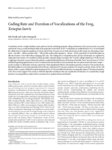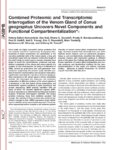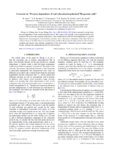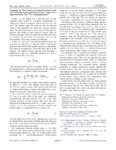|
|
Creator | Title | Description | Subject | Date |
| 226 |
 |
Yamaguchi, Ayako | Coding rate and duration of vocalizations of the frog , Xenopus laevis | Vocalizations involve complex rhythmic motor patterns, but the underlying temporal coding mechanisms in the nervous system are poorly understood. Using a recently developed whole-brain preparation from which "fictive" vocalizations are readily elicited in vitro, we investigated the cellular basis of... | | 2012-08-29 |
| 227 |
 |
Clayton, Dale H. | Coevolutionary history of ecological replicates: comparing phylogenies of wing and body lice to Columbiform hosts | Phylogenies depict the history of speciation for groups of organisms. Comparing the phylogenies of interacting groups can reveal instances of tandem speciation, or "cospeciation" (Brooks and McLennan, 1991; Hoberg et al., 1997; Paterson and Gray, 1997). Understanding the conditions under which cosp... | Feather lice; Wing lice; Body lice; Cospeciation | 2003 |
| 228 |
 |
Vardeny, Zeev Valentine | Coherent phonon generation and detection by picosecond light pulses | Using the picosecond pump and probe technique we have detected oscillations of photoinduced transmission and reflection in thin films of α-As2Te3 and cis-polyacetylene. These oscillations are due to the generation and propagation of coherent acoustic phonons in the film. We discuss the generation ... | a-As2Te3; Cis-polyacetylene; Pump and probe technique | 1984-09 |
| 229 |
 |
Vardeny, Zeev Valentine; Raikh, Mikhail E. | Coherent random lasing: trapping of light by the disorder | Recent discovery of the coherent lasing from various disordered materials adds a new dimension to the conventional physics of light propagation in multiply scattering media. It suggests that in the situation, when the propagation of light is diffusive on average, the coherent feedback can be provid... | Coherent random lasing; Coherent lasing; Disorder; Disordered materials; Random lasers; Random resonators; Power Fourier transform; Light propagation | 2004 |
| 230 |
 |
Vardeny, Zeev Valentine | Coherent umklapp scattering of light from disordered photonic crystals | A theoretical study of the coherent light scattering from disordered photonic crystals is presented. In addition to the conventional enhancement of the reflected light intensity into the backscattering direction, the so-called coherent backscattering (CBS), the periodic modulation of the dielectri... | Coherent umklapp scattering; Disordered photonic crystals; Coherent backscattering; Bragg | 2001-05 |
| 231 |
 |
Coley, Phyllis D. | Coibanoles, a new class of meroterpeniods produced by pycnoporus sanguineus | Three new terpenoids of mixed biosynthetic origin were isolated from the culture filtrate of the endophytic fungus Pycnoporus sanguineus. Their structures were determined by extensive spectroscopic analyses. We have named these tricyclic and tetracyclic metabolites ?coibanoles A?C? in reference to... | | 2012 |
| 232 |
 |
Miller, Joel Steven | Collinear ferromagnetism and spin orientation in the molecule-based magnets M[N(CN)2]2 (M=Co,Ni) | Zero-field unpolarized neutron powder diffraction has been used to study the low-T magnetic structure and T-dependent crystal structure of M[N(CN)2]2 (M=Co,Ni). Both compounds show collinear ferromagnetism with spin orientation along the c axis. The results provide the determination of a complete ma... | Magnetic; Diffraction; Structure | 1999 |
| 233 |
 |
Armentrout, Peter B. | Collision-induced dissociation dynamics of the [OCS • C2H2]+ complex. A combined experimental and theoretical study | Collision-induced dissociation (CID) of the [OCS • C2H2]+ complex ion with both Xe and Ar over an energy range of 0 to 10 eV in the center of mass frame is studied using a guided ion beam tandem mass spectrometer. The cross sections of the ionic products observed (C,H2S+, OCS+, C2HJ, and S+) are ... | Collision-induced dissociation; Competitive shift; Ethylene Sulfide cation; Kinetic shift; Thioketene cation; Potential energy surface | 2000 |
| 234 |
 |
Armentrout, Peter B. | Collision-induced dissociation of Fen+ (n=2-10) with Xe: ionic and neutral iron binding energies | Cross sections for collision-induced dissociation (CID) of Fen+ with Xe, 2≤n≤10, are presented. Experiments were performed on a newly constructed guided ion beam mass spectrometer, the design and capabilities of which are described in detail. The single mechanism for dissociation of iron cluster... | | 1989 |
| 235 |
 |
Armentrout, Peter B. | Collision-induced dissociation processes of Nb4+ and Fe4+: fission vs. evaporation | Despite the extensive effort devoted to research on gasphase metal clusters, quantitative thermodynamic data on such species are scarce. Such information is key to understanding and predicting the physical and chemical properties of clusters. Presently, bond energies are available primarily for tr... | Metal clusters; Nobium ions; Iron ions; Fission; Evaporation | 1988 |
| 236 |
 |
Coley, Phyllis D.; Kursar, Thomas A. | Colonization of tropical rain forest leaves by epiphylls: effects of site and host plant leaf lifetime | In humid tropical regions, leaves are frequently colonized by epiphylls (Richards 1954, Pocs 1978, 1982). Lichens and liverworts usually dominate, although mosses, algae, and cyanobacteria can also occur (Winkler 1971, Smith 1982). The interactions between epiphylls and host leaves have not been wel... | Tropical forest; Epiphylls; Panama; Hybanthus prunifolius; Light interception | 1993 |
| 237 |
 |
Olivera, Baldomero M. | Combined proteomic and transcriptomic interrogation of the venom gland of conus geographus uncovers novel components and functional compartmentalization | Cone snails are highly successful marine predators that use complex venoms to capture prey. At any given time, hundreds of toxins (conotoxins) are synthesized in the secretory epithelial cells of the venom gland, a long and convoluted organ that can measure 4 times the length of the snail's body. In... | | 2014-01-01 |
| 238 |
 |
Truong, Thanh | Combined reaction class approach with integrated molecular orbital + molecular orbital (IMOMO) methodology: a practical tool for kinetic modeling | We present a new practical computational methodology for predicting thermal rate constants of reactions involving large molecules or a large number of elementary reactions in the same class. This methodology combines the integrated molecular orbital1molecular orbital (IMOMO) approach with our rece... | IMOMO; Kinetic modeling; Thermal rate constants | 2000 |
| 239 |
 |
Ailion, David Charles | Commensurability and defect-induced phason gaps in incommensurate systems | The phason energy gap has been observed to increase on going from the incommensurate to higher-order commensurate phases in the "devil's staircase" compound [N(CH3)4]2ZnCl4. The gap was determined via the phason-induced 1 4N spin-lattice relaxation contribution, which was obtained from the variati... | Phasons; Commensurate; Incommensurate; Lattices; Modulation | 1985 |
| 240 |
 |
Vardeny, Zeev Valentine; Ehrenfreund, Eitan A. | Comment on "Frequency response and origin of the spin-½ photoluminescence-detected magnetic resonance in a ∏-conjugated polymer | In a recent paper, Segal et al. [Phys. Rev. B 71, 245201 (2005)] advanced a new explanation for the dynamics of spin-1/2 photoluminescence-detected magnetic resonance (PLDMR) in films of a rr-conjugated polymer, namely, a soluble derivative of poly(phenylene-vinylene) (MEH-PPV), using a model [dubbe... | Photoluminescence-detected magnetic resonance; PLDMR; pi-conjugated polymers; Poly(phenylene-vinylene); MEH-PPV | 2007-06 |
| 241 |
 |
Mattis, Daniel C. | Comment on "Ground-state properties of a spin-1 antiferromagnetic chain | Botet and Jullien [Phys. Rev. B 27, 613 (1983)] and Botet, Jullien, and Kolb [Phys. Rev. B 28, 3914 (1983)] performed a finite-size scaling analysis of the spin-1 antiferromagnetic Heisenberg-Ising chain. Their work was criticized by Bonner and Mtiller [Phys. Rev. B 29, 5216 (1984)] on the grounds... | Antiferromagnets; Ground-state; Ising chain; Energy gap | 1985-04 |
| 242 |
 |
Vardeny, Zeev Valentine | Comment on "Large optical nonlinearity of semiconducting single-walled carbon nanotubes under resonant excitations" | In a recent Letter Maeda et al. studied the optical nonlinearities of single-walled carbon nanotubes (SWNT) films using both ??Z-scan?? and ??pump and probe?? (PP) techniques with ~100 fs time resolution [1]. They found that SWNTs have a large resonant third-order nonlinear optical susceptibili... | SWNT; Coherent artifact | 2006 |
| 243 |
 |
Vardeny, Zeev Valentine; Ehrenfreund, Eitan A. | Comment on "Yield of singlet excitons in organic light-emitting devices: a double modulation photoluminescence-detected magnetic resonance study" | In a recent Letter [1] Lee et al. studied the spin 1/2 photoluminescence-detected magnetic resonance (PLDMR) of a soluble derivative of poly-phenylene vinylene [MEH-PPV] using a double modulation scheme, where both the laser excitation intensity and the microwave power were modulated at ?ex and ?... | Singlet excitons; PLDMR; Poly-phenylene vinylene; MEH-PPV; Quenching; Spin dependent recombination; OLED | 2006 |
| 244 |
 |
Saam, Brian | Comment on pressure dependence of wall relaxation in polarized 3He gaseous cells | Zheng et al. [Zheng, Gao, Ye, and Zhang, Phys. Rev. A 83, 061401(R) (2011)] have measured a strong linear pressure dependence of the nuclear relaxation rate of 3He in glass cells typically used to generate and/or store polarized 3He at room and cryogenic temperatures. Their interpretation is that th... | | 2012-01-01 |
| 245 |
 |
Saam, Brian | Comment on: New limit on lorentz-invariance- and CPT-violating neutron spin interactions using a free-spin-precession 3He- 129Xe comagnetometer | In Ref. [1], the authors use a classical result for the magnetic field created by a uniform magnetization to analyze the effects of magnetic interactions between 3He and 129Xe nuclear spins. We point out that the classical result is not applicable for interaction between nuclear spins: the actual in... | | 2014-01-01 |
| 246 |
 |
Clayton, Dale H. | Common grackle anting with lime fruit and its effect on ectoparasites | Anting is stereotyped behavior in which birds ex- pose themselves to fluid-secreting ants or other pun- gent substances. During "active" anting a bird crush- es an ant in the bill and rubs it frenetically through its plumage (Rothschild and Clay 1952). During "passive" anting a bird entices ants to ... | Quiscalus quiscala; Columbicola columbae; Anting; Ectoparasites | 1993 |
| 247 |
 |
Armentrout, Peter B. | Communication: Theoretical exploration of Au++ H2, D2, and HD reactive collisions | A quasi-classical study of the endoergic Au+(¹S) + H₂(X¹Σ+g) → AuH+ (²Σ+) + H(²S) reaction, and isotopic variants, is performed to compare with recent experimental results [F. Li, C. S. Hinton, M. Citir, F. Liu, and P. B. Armentrout, J. Chem. Phys. 134, 024310 (2011)]. For this purpose, a ... | | 2011 |
| 248 |
 |
Clayton, Dale H. | Comparative effects of mites and lice on the reproductive success of rock doves (Columba livia) | We report experimental data comparing the effects of Mesostigmatid mites and Ischnoceran lice on the reproductive performance of a single group of captive rock doves (Columba livid). Several components of host reproductive success were compared for the two groups, including number of eggs laid, hatc... | Ectoparasites; Reproduction; Rock doves; Columba livia; Ischnocera; Mites; Lice | 1995 |
| 249 |
 |
Davidson, Diane W. | Comparative structure of harvester ant communities in arid Australia and North America | In the Australian arid zone, the species richness of ants is greater and that of mammalian granivores is less than in North American deserts. This study aimed to determine if the structure of harvester ant communities differs from that seen in North American deserts, focussing on differences relate... | Species; Rodents; Diversity | 1988 |
| 250 |
 |
Clayton, Dale H.; Bush, Sarah Elizabeth | Comparative transmission dynamics of competing parasite species | Competition-colonization trade-off models explain the coexistence of competing species in terms of a trade-off between competitive ability and the ability to colonize competitor-free patches of habitat. A simple prediction of these models is that inferior competitors will be superior dispersers. Thi... | Bird lice; Campanulotes compar; Coexistence; Colonization; Columba livia; Columbicola columbae; Competition; Dispersal; Parasite; Phoresis; Specificity; Pseudolynchia canariensis; Phthiraptera | 2008 |

























